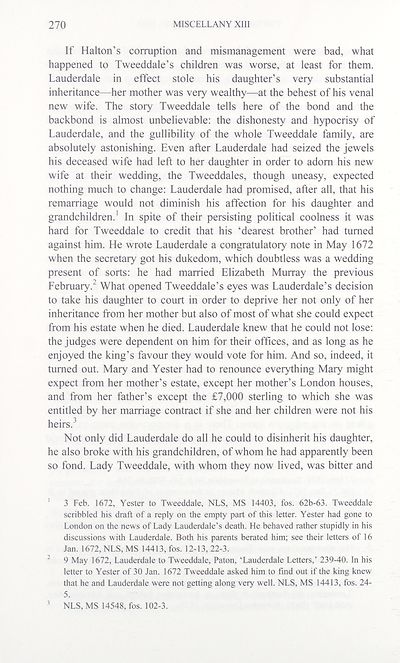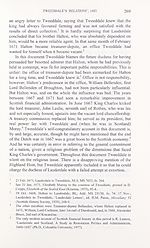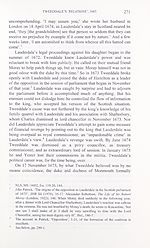Series 5 > Miscellany [of the Scottish History Society] XIII
(285) Page 270
Download files
Complete book:
Individual page:
Thumbnail gallery: Grid view | List view

270
MISCELLANY XIII
If Halton’s corruption and mismanagement were bad, what
happened to Tweeddale’s children was worse, at least for them.
Lauderdale in effect stole his daughter’s very substantial
inheritance—her mother was very wealthy—at the behest of his venal
new wife. The story Tweeddale tells here of the bond and the
backbond is almost unbelievable: the dishonesty and hypocrisy of
Lauderdale, and the gullibility of the whole Tweeddale family, are
absolutely astonishing. Even after Lauderdale had seized the jewels
his deceased wife had left to her daughter in order to adorn his new
wife at their wedding, the Tweeddales, though uneasy, expected
nothing much to change: Lauderdale had promised, after all, that his
remarriage would not diminish his affection for his daughter and
grandchildren.1 In spite of their persisting political coolness it was
hard for Tweeddale to credit that his ‘dearest brother’ had turned
against him. He wrote Lauderdale a congratulatory note in May 1672
when the secretary got his dukedom, which doubtless was a wedding
present of sorts: he had married Elizabeth Murray the previous
February.2 What opened Tweeddale’s eyes was Lauderdale’s decision
to take his daughter to court in order to deprive her not only of her
inheritance from her mother but also of most of what she could expect
from his estate when he died. Lauderdale knew that he could not lose:
the judges were dependent on him for their offices, and as long as he
enjoyed the king’s favour they would vote for him. And so, indeed, it
turned out. Mary and Yester had to renounce everything Mary might
expect from her mother’s estate, except her mother’s London houses,
and from her father’s except the £7,000 sterling to which she was
entitled by her marriage contract if she and her children were not his
heirs.3
Not only did Lauderdale do all he could to disinherit his daughter,
he also broke with his grandchildren, of whom he had apparently been
so fond. Lady Tweeddale, with whom they now lived, was bitter and
1 3 Feb. 1672, Yester to Tweeddale, NLS, MS 14403, fos. 62b-63. Tweeddale
scribbled his draft of a reply on the empty part of this letter. Yester had gone to
London on the news of Lady Lauderdale’s death. He behaved rather stupidly in his
discussions with Lauderdale. Both his parents berated him; see their letters of 16
Jan. 1672, NLS, MS 14413, fos. 12-13,22-3.
2 9 May 1672, Lauderdale to Tweeddale, Paton, 'Lauderdale Letters,’ 239-40. In his
letter to Yester of 30 Jan. 1672 Tweeddale asked him to find out if the king knew
that he and Lauderdale were not getting along very well. NLS, MS 14413, fos. 24-
5.
NLS, MS 14548, fos. 102-3.
MISCELLANY XIII
If Halton’s corruption and mismanagement were bad, what
happened to Tweeddale’s children was worse, at least for them.
Lauderdale in effect stole his daughter’s very substantial
inheritance—her mother was very wealthy—at the behest of his venal
new wife. The story Tweeddale tells here of the bond and the
backbond is almost unbelievable: the dishonesty and hypocrisy of
Lauderdale, and the gullibility of the whole Tweeddale family, are
absolutely astonishing. Even after Lauderdale had seized the jewels
his deceased wife had left to her daughter in order to adorn his new
wife at their wedding, the Tweeddales, though uneasy, expected
nothing much to change: Lauderdale had promised, after all, that his
remarriage would not diminish his affection for his daughter and
grandchildren.1 In spite of their persisting political coolness it was
hard for Tweeddale to credit that his ‘dearest brother’ had turned
against him. He wrote Lauderdale a congratulatory note in May 1672
when the secretary got his dukedom, which doubtless was a wedding
present of sorts: he had married Elizabeth Murray the previous
February.2 What opened Tweeddale’s eyes was Lauderdale’s decision
to take his daughter to court in order to deprive her not only of her
inheritance from her mother but also of most of what she could expect
from his estate when he died. Lauderdale knew that he could not lose:
the judges were dependent on him for their offices, and as long as he
enjoyed the king’s favour they would vote for him. And so, indeed, it
turned out. Mary and Yester had to renounce everything Mary might
expect from her mother’s estate, except her mother’s London houses,
and from her father’s except the £7,000 sterling to which she was
entitled by her marriage contract if she and her children were not his
heirs.3
Not only did Lauderdale do all he could to disinherit his daughter,
he also broke with his grandchildren, of whom he had apparently been
so fond. Lady Tweeddale, with whom they now lived, was bitter and
1 3 Feb. 1672, Yester to Tweeddale, NLS, MS 14403, fos. 62b-63. Tweeddale
scribbled his draft of a reply on the empty part of this letter. Yester had gone to
London on the news of Lady Lauderdale’s death. He behaved rather stupidly in his
discussions with Lauderdale. Both his parents berated him; see their letters of 16
Jan. 1672, NLS, MS 14413, fos. 12-13,22-3.
2 9 May 1672, Lauderdale to Tweeddale, Paton, 'Lauderdale Letters,’ 239-40. In his
letter to Yester of 30 Jan. 1672 Tweeddale asked him to find out if the king knew
that he and Lauderdale were not getting along very well. NLS, MS 14413, fos. 24-
5.
NLS, MS 14548, fos. 102-3.
Set display mode to:
![]() Universal Viewer |
Universal Viewer | ![]() Mirador |
Large image | Transcription
Mirador |
Large image | Transcription
Images and transcriptions on this page, including medium image downloads, may be used under the Creative Commons Attribution 4.0 International Licence unless otherwise stated. ![]()
| Scottish History Society volumes > Series 5 > Miscellany [of the Scottish History Society] XIII > (285) Page 270 |
|---|
| Permanent URL | https://digital.nls.uk/127316949 |
|---|
| Description | Over 180 volumes, published by the Scottish History Society, containing original sources on Scotland's history and people. With a wide range of subjects, the books collectively cover all periods from the 12th to 20th centuries, and reflect changing trends in Scottish history. Sources are accompanied by scholarly interpretation, references and bibliographies. Volumes are usually published annually, and more digitised volumes will be added as they become available. |
|---|


